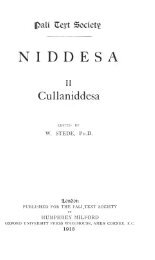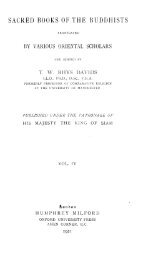Lessons In Practical Buddhism - Sirimangalo.Org
Lessons In Practical Buddhism - Sirimangalo.Org
Lessons In Practical Buddhism - Sirimangalo.Org
Create successful ePaper yourself
Turn your PDF publications into a flip-book with our unique Google optimized e-Paper software.
that it is unpleasant. And so on.<br />
The whole of our lives thus revolve around these two<br />
realities, the mind and the resulting mental-physical<br />
experience of objects by the mind. This process is not really<br />
a problem in and of itself; obviously we cannot avoid<br />
experience, and there’s no suffering that comes from it<br />
directly. <strong>Practical</strong>ly speaking, suffering doesn’t come from<br />
the objects of experience; it comes, as stated, from our<br />
misunderstanding of the experience.<br />
Once there arises the mental-physical matrix, there will arise<br />
the six senses – seeing, hearing, smelling, tasting, feeling,<br />
and thinking – which are the base for physical and mental<br />
experience. Mundane consciousness always arises either at<br />
the eye, the ear, the nose, the tongue, the body or the mind.<br />
When seeing, the eye and the light touching it are physical<br />
and the mind that is aware of the experience is mental; when<br />
hearing, the sound and the ear are physical and the knowing<br />
of the sound is mental. Each of the six senses serves as a<br />
base for mental-physical experience of reality.<br />
Because of the six senses, there arises contact between the<br />
mental and the physical, which is the next link in the chain of<br />
dependent origination. When the mind seeks out the eye,<br />
the ear, the nose, the tongue, or even thoughts, there is<br />
contact between the mind and its object; without the six<br />
senses, there is no meeting of the two, so the Buddha<br />
explained that the six senses lead to contact. Then, once<br />
there is contact, there arises feeling, either pleasant,<br />
unpleasant, or neutral; without the mind coming in contact<br />
with the senses, feeling cannot arise, so the Buddha<br />
explained that feeling arises based on contact.<br />
These five aspects of reality – consciousness,<br />
mental-physical experience, the senses, contact, and feeling<br />
– are the neutral aspects of reality. Life would be without<br />
suffering if our minds were able to stop at feeling and just<br />
experience everything as it is. For this reason, these five are<br />
the most important aspects of reality for us to investigate.<br />
Once we come to understand them clearly, to see them for<br />
what they are, we won’t resort to further complication, which<br />
is where we fall into trouble.<br />
114












